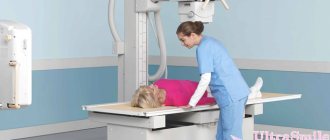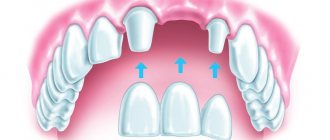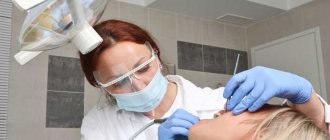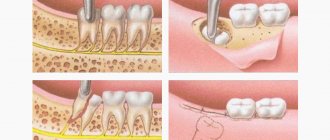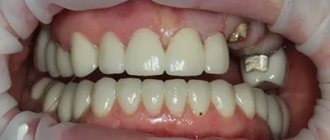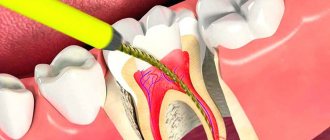Why did the crown fall off?
Most often, the process of swallowing is invisible; a person understands this only after finishing the meal and the absence of an artificial tooth. Usually the cause is the consumption of solid foods, for example, the process of chewing tough meat. If the problem occurs shortly after dental prosthetics, the reason is poor-quality installation and unreliable fixation of the crown. The second option is that the crown fell off after a long time. Most likely, the prosthesis has expired, so the artificial material could not withstand the next load.
Preventive measures
The baby's relatives must do everything to prevent a dangerous situation: the little one should not choke on the crown bone. How to do it? The child needs to be explained that the unsteady unit requires observation. Mom will often look at the tooth. It will definitely fall out, so you need to be prepared for it. The baby should not be given solid food for some time. Relatives should help the little one get through a difficult moment by caring for him.
It is important to follow recommendations for the prevention of caries in children. The mother should think about this during pregnancy. There should be no deficiency of fluoride and calcium in a woman’s body. After the birth of a toddler, you need to carefully follow hygiene standards, do not lick nipples and spoons. The organization of a balanced diet is of particular importance. Include kefir, milk, and baby yoghurts in your diet. To absorb calcium, vitamin D is needed. A child can get it from fish dishes and sunbathing.
It is necessary to limit the consumption of sweets, because harmful streptococci feed on sugars. During their life, they release acid that destroys enamel. Fresh vegetables and fruits are healthy. A reliable remedy against caries is baby paste and a toothbrush. As soon as the milk chewing organs appear, they need to be cleaned. Teach your child hygiene skills from an early age. Take your child to the dentist twice a year. The doctor will detect the disease in the early stages and prescribe therapy.
Assessment of the situation
First of all, you need to stop panicking and tune in to a positive outcome. First, you should examine the oral cavity and understand whether the crown has fallen off completely or only part of it. In fact, the second option is more dangerous, since there is a high probability that part of the broken prosthesis has too sharp edges. This is fraught with damage to the gastrointestinal tract - perhaps this is the most dangerous complication.
If the artificial tooth falls off completely, there is a high probability that the crown will come out naturally, without causing complications or various troubles. If you experience any disturbing digestive symptoms, go to the doctor immediately!
Why can baby teeth fall out unnoticed?
A 5-year-old child already has a full set of primary dentitions and is already beginning to loosen for prolapse. It would seem that the most unpleasant period has passed, the child no longer suffers from the unpleasant sensations that bother him during teething. But this may not be the easiest time for parents.
When baby crowns fall out, there is a risk that they will be accidentally swallowed. This happens because they begin to loosen. When applying pressure while chewing, there is a high probability that it will fall out and enter the stomach along with food. Moreover, even the child does not immediately notice that he has parted with his incisor.
During the period of change in bite, the crowns become very loose and are ready to fall out at any moment. That is, it is physiologically designed in such a way that it should not cause unpleasant sensations. For this reason, the baby does not notice the “loss”.
However, after the prolapse, you can see the hole from which the blood comes. It's not much, but it's noticeable. The hole requires more attention than a swallowed piece of crown.
What can be done?
In order to increase the chances of the crown coming out naturally, you need to slightly reconsider your usual diet. Experts recommend including more fiber, fruits and vegetables in your menu. The most important thing is to drink as much liquid as possible: juices, tea, water. This is necessary in order to prevent constipation. Do not under any circumstances try to induce vomiting as you have discovered the “loss”.
Please note that the information is provided for informational purposes. Before you do anything, you must undergo diagnostic procedures and follow the doctor’s recommendations.
Kids are very inquisitive and want to try and taste everything that comes into their hands. Sometimes children may swallow foreign objects while eating or playing. If it was not possible to prevent the situation, it is extremely important for parents not to get confused, to sensibly assess the situation and provide first aid to the child.
What can a child swallow?
Objects that can get into the baby’s gastrointestinal tract can be divided into two large groups:
- Particularly dangerous foreign bodies:
- battery, magnet, coin, pin, glass, nail, foil, iron balls, screws, nails, toothpick, paper clip, fish bone, wooden stick;
- substances with poisonous and toxic properties.
- Less dangerous foreign bodies:
- pits from plums, cherries, peach, chewing gum
- plastic and rubber items (plastic buttons, beads, Legos, vacuum bands from headphones, cellophane);
— building materials (spray foam, silica gel);
— body parts (lost baby teeth, hair);
- other products (stone, plasticine, hair elastic, thread, cotton wool, etc.).
Signs and symptoms that indicate your child has swallowed a small object
If you did not see that your child had swallowed a foreign body and did not take any action, over time he may develop the following symptoms:
- excessive salivation;
- anxiety;
- bouts of severe coughing, difficulty breathing;
- a sharp rise in temperature;
- bloating, sharp and severe pain;
- presence of blood in saliva or stool;
- chest pain;
- nausea and vomiting
- refusal of food.
We must not forget that in rare cases, an asymptomatic course of this pathology is observed. In this group of patients, the diagnosis is made already when various complications appear.
If you see that the child has suddenly started coughing, choking, or turned pale, you should immediately take him to the hospital. The main thing for parents in such a situation is not to panic.
Under no circumstances should you:
- give enemas or give the young researcher laxatives.
Artificially speeding up the digestive system can lead to a number of undesirable consequences. A foreign object can injure the walls of internal organs with its edges and get stuck in the intestines, thereby causing its obstruction;
- force the baby to eat a piece of solid food, for example, a crust of stale bread;
- try to remove the foreign body using tweezers or a magnet.
What will they do at the hospital?
Complaints and medical history are not criteria for reliably establishing the presence or absence of foreign bodies in the esophagus.
The main diagnostic method in such cases is esophagoscopy, which turns from a diagnostic procedure into a therapeutic one. The tactic of performing esophagoscopy is justified in all patients with foreign bodies of the esophagus or with reasonable suspicion.
Possible consequences
Waiting for the moment when a dangerous foreign body leaves the body on its own can cost the child’s life. So, when a battery gets into the gastric juice, it begins to oxidize and release toxic substances that are harmful to health.
Over the past 15 years, the Irkutsk Regional Children's Clinical Hospital has provided assistance to 185 children with foreign bodies lodged in the esophagus. The main age group consisted of children from 1 to 3 years old (more than 65%). Foreign bodies removed by doctors turned out to be coins in 71% of cases, and in 17% of children - toy parts, food fragments and batteries. The presence of a foreign body in the esophagus for more than three days can lead to serious consequences and even death of the disease. The most serious complication is perforation of the esophagus and, as a consequence, various complications: neck phlegmon, mediastinitis, bleeding.
Dentist appointment
Now let's move on to the question of the aesthetics of a smile. Even if the crown has not completely fallen off, it still needs to be replaced with a new one. We advise you to contact a trusted dentist to ensure that the prosthesis is securely fixed. For maximum reliability, we recommend giving preference to higher quality materials, such as ceramics or cermets. Plastic is a budget option, but the service life and reliability of fastening leave much to be desired.
To prevent such situations, we recommend visiting the dentist every six months. In this case, there is a chance that the doctor will promptly notice the unreliable fixation of the artificial tooth and prevent further problems. Also pay attention to the service life of the crown. If it is designed for 5 years, after the period has passed, you need to see a specialist and take an impression to make a new prosthesis.
At what age is the risk of swallowing a tooth high?
A tooth can fall out and be swallowed as a result of injury, such as an impact from a fall. In such a situation, complete dislocation is possible, when all periodontal fibers are torn and the tooth loses connection with the socket. However, such cases are rare. Most children swallow baby teeth that fall out before the permanent teeth appear. The roots of temporary teeth gradually dissolve, and they fall out painlessly, sometimes even unnoticed. The child swallows them just as unnoticed. This often happens during eating, when the chewing force separates the loose tooth from the gum, and along with a lump of food it is sent into the esophagus.
The most likely age for swallowing a tooth is the period of change from a temporary bite to a permanent one. Each group of teeth changes at a certain age:
- change of central incisors - 5–9 years;
- change of lateral incisors - 7–10 years;
- change of first premolars - 9–13 years;
- change of second premolars - 9–14 years;
- change of fangs - 9–14 years.
Moreover, even such approximate dates are not always observed: they can be influenced by diseases suffered in childhood, nutritional patterns, water quality, and climatic conditions [1, 2].
It should be remembered that the timing of the eruption of both primary and permanent teeth may vary.
A deviation in one direction or another within 6 months is considered normal for a particular child. Vinogradova T. F., Doctor of Medical Sciences, Professor [2]
Waiting for the tooth fairy
The most popular tradition in the modern world is the tale of the tooth fairy. This tradition began in Iceland, but gradually it spread to America, and then it was adopted by almost the whole world. This transition occurred thanks to the cartoons that children watch.
According to tradition, when a baby loses a baby tooth, he should put it under the pillow, and when the child falls asleep, a little fairy with wings flies to him. With a wave of her magic wand, she takes out a tooth from under the pillow, and in its place puts a coin or sweets. This is the fairy tale that modern children believe.
If a tooth was removed at a dental clinic, then parents can confidently ask the dentist to give the tooth back so as not to upset the child, and also put it under the pillow at night.
Parents who do not believe in omens requiring burning, burying or any other actions with baby teeth can, after “magically” replacing the tooth with sweets or money, wrap the tooth in a napkin and dispose of it in the usual way. Whatever decision is made, it is important to preserve the child’s faith in magic and the importance of the events taking place.
First aid for a child if he has swallowed a tooth
The first step is to calm the child down and explain to him that nothing bad happened. This is especially true if the wound is bleeding, since many children are afraid of blood and may consider it a sign of danger. Next you should tackle the hole:
- Biting on a cotton swab for 5–10 minutes helps stop the bleeding. If the bleeding does not stop, you should consult a doctor.
- To disinfect the hole, you can rinse with saline solution or chamomile infusion. It is not allowed to use strong antiseptic and anti-inflammatory drugs without the recommendation of a dentist.
- For healing to occur, the hole needs to be kept at rest: do not eat anything and try not to drink for two hours. Until the next day, it is better to avoid irritating foods: hot, sour, spicy [3, 6].
To facilitate the passage of the tooth through the digestive system, it is worth limiting activity. After the two-hour break in food is over, offer your child raw vegetables, fruits, and whole grains - they will help the tooth move [5].
Typically, it takes 12–14 hours for a tooth to pass through the gastrointestinal tract. If you want to control its output, you can give your child some corn kernels. They leave the intestines unchanged, and their presence in the stool will be a signal that the tooth has also left the body [5].
Is it possible to do without visiting a doctor?
It is possible if no discomfort is felt. Tooth enamel and the “body” of the tooth do not pose any threat even if they are damaged by caries. The body will easily tolerate this and “pass” a foreign object through the gastrointestinal tract without damage.
The closest analogy is to imagine that you swallowed a cherry pit.
A swallowed crown or filling is still worth a visit to the doctor in any case. This way you can prevent further destruction and not endanger neighboring healthy teeth.
If a crown or filling is swallowed
Fillings with sharp edges carry the same potential danger to the esophageal mucosa as teeth, but they are much smaller in volume. Fillings may also not fall off completely, but rather break off into small fragments that pose almost no danger.
Important! If a fresh filling is swallowed, immediately contact the dentist who placed it. It was either placed incorrectly or fell out due to its unreliability. An infection should not get into a hole recently filled with a filling - the chance of infection and inflammation is very high.
A swallowed crown will not cause any harm in itself, but you should visit the dentist as soon as possible to protect the remaining tooth without a crown.
The crowns are also small in size and if they get into the esophagus and further, they will not cause harm (except for possible micro-scratches). If a filling or crown falls out, you need to immediately fix this problem by installing a new one, even if the tooth does not hurt or bother you in any way. Open dental canals and healthy parts of the tooth will begin to deteriorate after a few weeks from eating food or hot liquids. Due to delay, there may be a need to completely re-treat the tooth.
Is there a danger in swallowing a tooth?
Children may refuse to pull loose teeth out of fear of pain. Nevertheless, they themselves show interest, constantly touching it with their tongue or hands.
There are cases of swallowing baby teeth, especially during meals. There is no reason to worry about this unless the child is choking.
What is swallowed will simply pass through the digestive tract and leave the host naturally. Particularly suspicious relatives can monitor this process by examining the offspring’s stool, but this recommendation is not mandatory.
From this video you will learn what happens if you swallow a tooth:
Do I need to restore a broken or lost tooth?
Dentists at the DentoSpas clinic do not recommend leaving gaps in the dentition. It is better to plan and perform restoration, implantation or prosthetics as quickly as possible. Without treatment, bone tissue atrophy will begin, the load on adjacent crowns will increase, and the chewing load will begin to be distributed unevenly. This will lead to displacement of neighboring teeth and may cause their loss. If left untreated, a broken or chipped crown will continue to deteriorate and repair will become impossible. With advanced caries, periodontal disease, and periodontitis after tooth loss, the disease does not go away on its own; it continues to develop until complete edentia.
Binge eating
This mistake is made by people who are not familiar with the structure of the digestive system. The only option when this solution can be partially correct is that the tooth is stuck at the end of the esophagus and you feel it somewhere above the stomach.
You can eat a small piece of black bread (white is more sticky), fruit or vegetable (preferably with a dense consistency). If after this the sensations do not change in any way, try again in half an hour. You can drink water.
Important! Feelings can be distorted by worry and anxiety - there have been cases when people, frightened by far-fetched threats, feel pressure and scratches from within that are not there. You can check your condition with a moderate sip of water.
In addition, a swallowed crown or other metal element of dental corrective structures will not be visible on an x-ray due to the large amount of food in the stomach and waste in the intestines.
